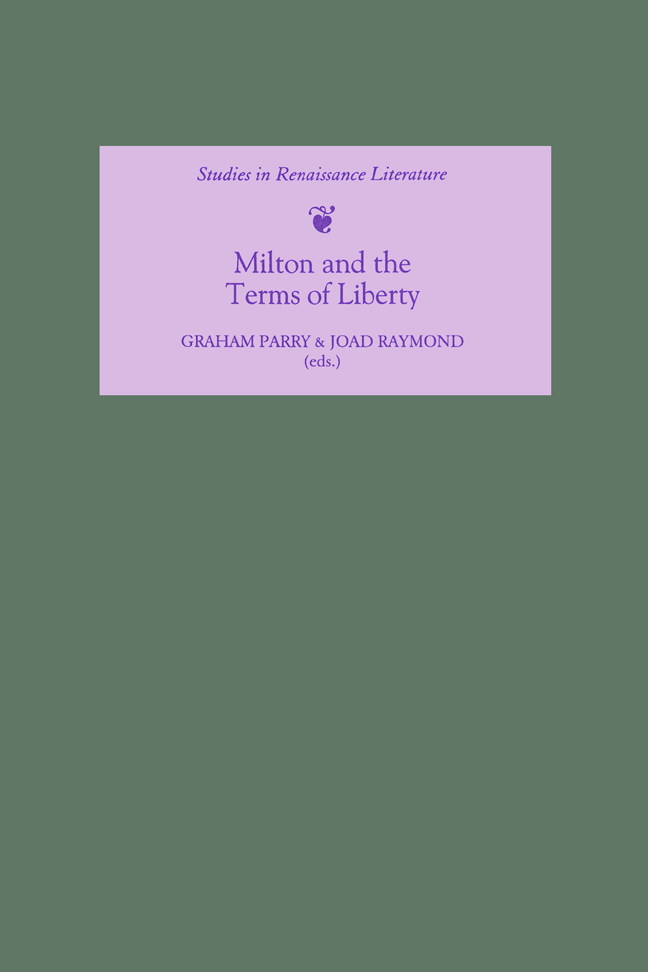Book contents
- Frontmatter
- Contents
- Contributors
- Acknowledgements
- Introduction
- 1 John Milton and the Politics of Slavery
- 2 Milton before ‘Lycidas'
- 3 Prosody and Liberty in Milton and Marvell
- 4 'In These Western Parts of the Empire': Milton and Roman Law
- 5 The King is a Thing
- 6 'in time of Warre … our Language is all corrupt with military Tearms': The Politics of Martial Metaphors in Post-regicide England
- 7 Alexander More Reads Milton: Self-representation and Anxiety in Milton's Defences
- 8 Stylometry and the Provenance of De doctrina christiana
- 9 The Figure and the Ground: Samson as a Hero of London Nonconformity, 1662-1667
- 10 The Publication of the King's Privacy: Paradise Regained and Of True Religion in Restoration England
- 11 'To try, and teach the erring Soul': Milton's Last Seven Years
- 12 Pandemonic Panoramas: Surveying Milton's ‘vain empires’ in the Long Eighteenth Century
- Index
- Studies in Renaissance Literature
8 - Stylometry and the Provenance of De doctrina christiana
Published online by Cambridge University Press: 15 February 2024
- Frontmatter
- Contents
- Contributors
- Acknowledgements
- Introduction
- 1 John Milton and the Politics of Slavery
- 2 Milton before ‘Lycidas'
- 3 Prosody and Liberty in Milton and Marvell
- 4 'In These Western Parts of the Empire': Milton and Roman Law
- 5 The King is a Thing
- 6 'in time of Warre … our Language is all corrupt with military Tearms': The Politics of Martial Metaphors in Post-regicide England
- 7 Alexander More Reads Milton: Self-representation and Anxiety in Milton's Defences
- 8 Stylometry and the Provenance of De doctrina christiana
- 9 The Figure and the Ground: Samson as a Hero of London Nonconformity, 1662-1667
- 10 The Publication of the King's Privacy: Paradise Regained and Of True Religion in Restoration England
- 11 'To try, and teach the erring Soul': Milton's Last Seven Years
- 12 Pandemonic Panoramas: Surveying Milton's ‘vain empires’ in the Long Eighteenth Century
- Index
- Studies in Renaissance Literature
Summary
THE question of Milton's authorship of De doctrina christiana has occupied the attention of Milton scholars for more than a decade now. The initial challenge to Milton's authorship came from William Hunter at a session of the International Milton Symposium in Vancouver, 1991. After Hunter's argument appeared in print, Christopher Hill and Maurice Kelley vigorously contested Hunter's claims. Despite the immense authority of his opponents and their deeply informed rebuttals, the seeds of doubt planted by Hunter have flourished in subsequent Milton scholarship. When citing De doctrina christiana to support or amplify an argument about Milton's writings, politic critics now include heavily annotated qualifications and disclaimers, taking care to thank Professor Hunter for inspiring a fresh inspection of the treatise in question. The continuing hesitation among Milton scholars owes not so much to Hunter's persistence, however, not after the trenchant replies with which his challenge has been met, as it does to the efforts of a self-begot committee of experts, mostly British, led by Thomas Corns and Gordon Campbell. Six years after Hunter's original challenge, this committee produced a bulky, equivocal report that brought quantitative analysis to bear on the question of provenance and concluded by denying the reliability of De doctrina christiana as a guide to Milton's beliefs and endorsing skepticism as to the authorship of the treatise. Because the membership of this committee includes key organizers of recent international Milton symposia, as well as other institutionalized occasions devoted to Milton studies, those who do not value the challenge to Milton's authorship and find the committee's conclusions dubious, have found it heavy going.
Three of the report's eight conclusions are critical to the case against use of the treatise in elucidating Milton's other works:
iv) The manuscript [of De doctrina christiana] has two principal strata, an ur- text and a transformation of that text effected by a process of revision which primarily consisted of the accretion of material by Milton.
v) Some parts of the manuscript show more evidence of Miltonic composition than others; some parts may be wholly of Miltonic origin; others show stylometric characteristics unlike Milton's; much of the manuscript probably constitutes a Miltonic appropriation and transformation that finds precedent in Milton's practice in the production of the Artis logicae….
- Type
- Chapter
- Information
- Milton and the Terms of Liberty , pp. 125 - 136Publisher: Boydell & BrewerPrint publication year: 2002



